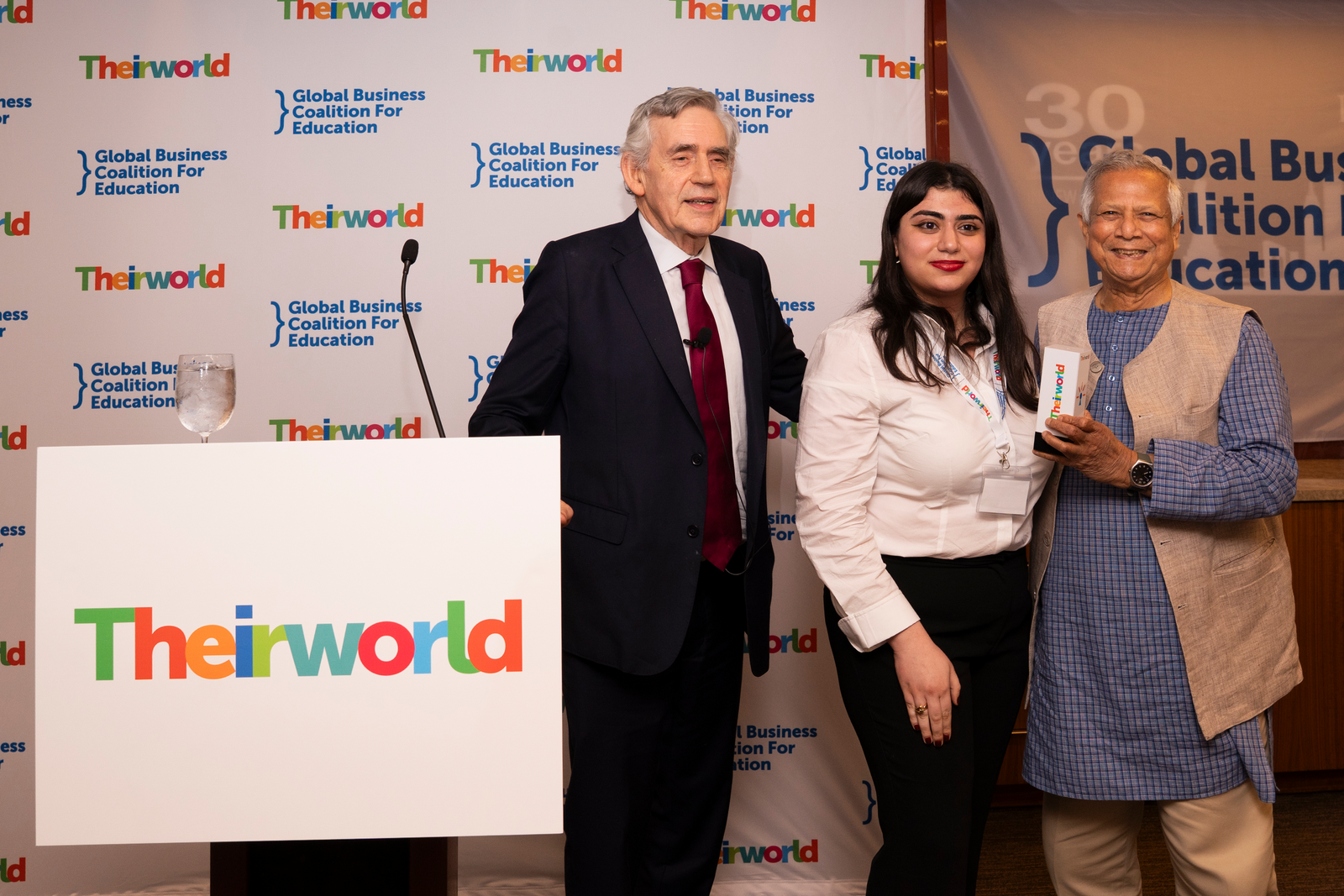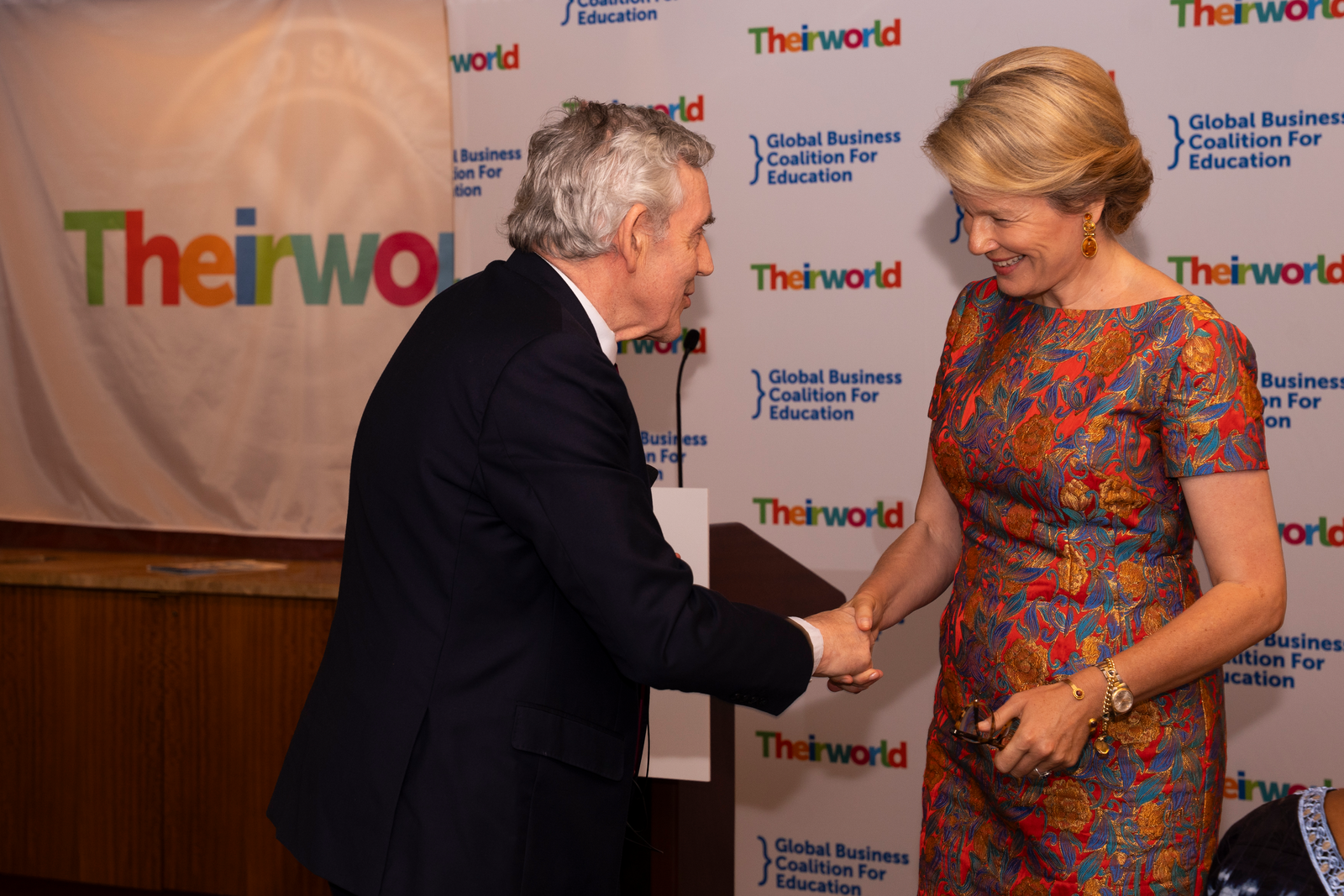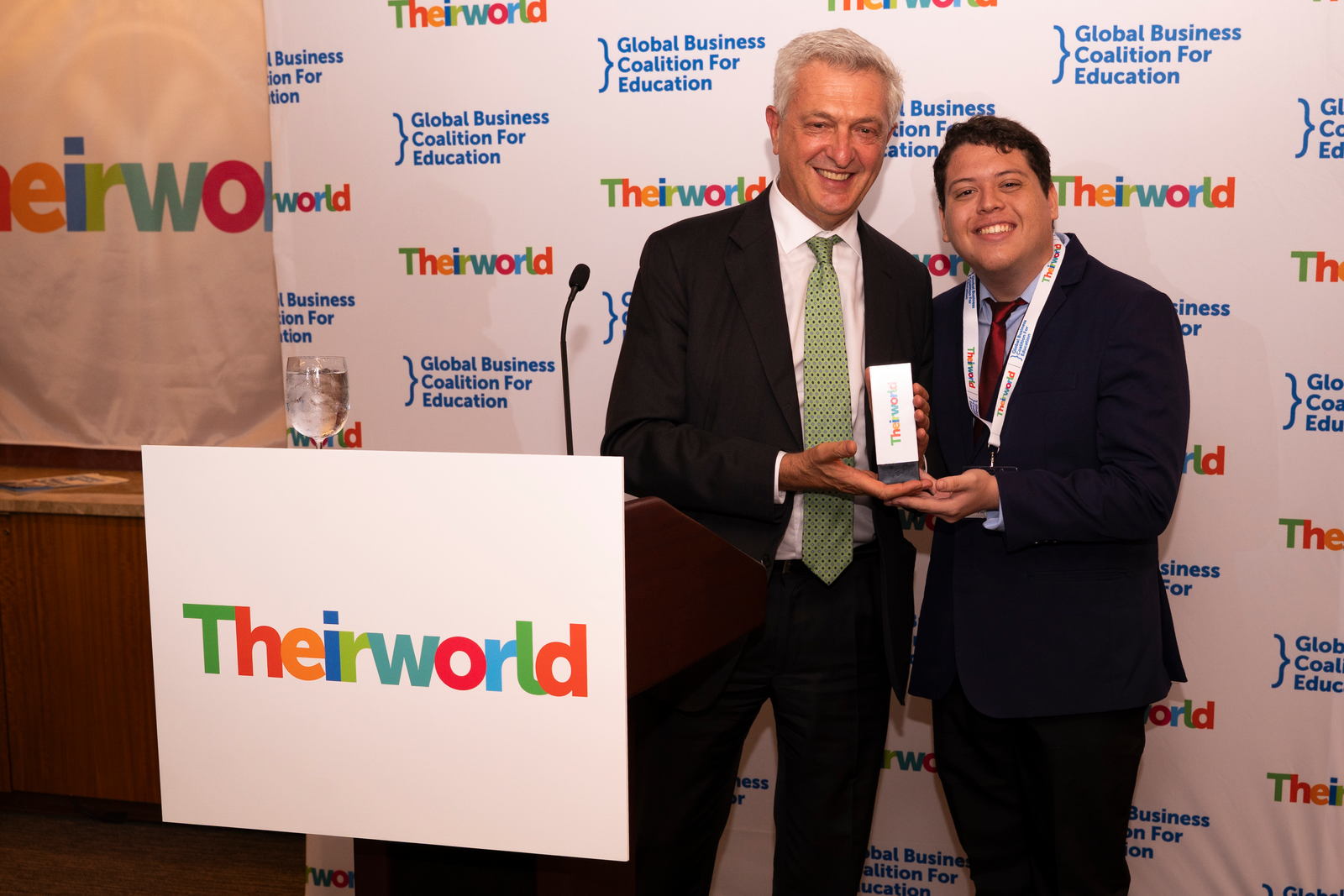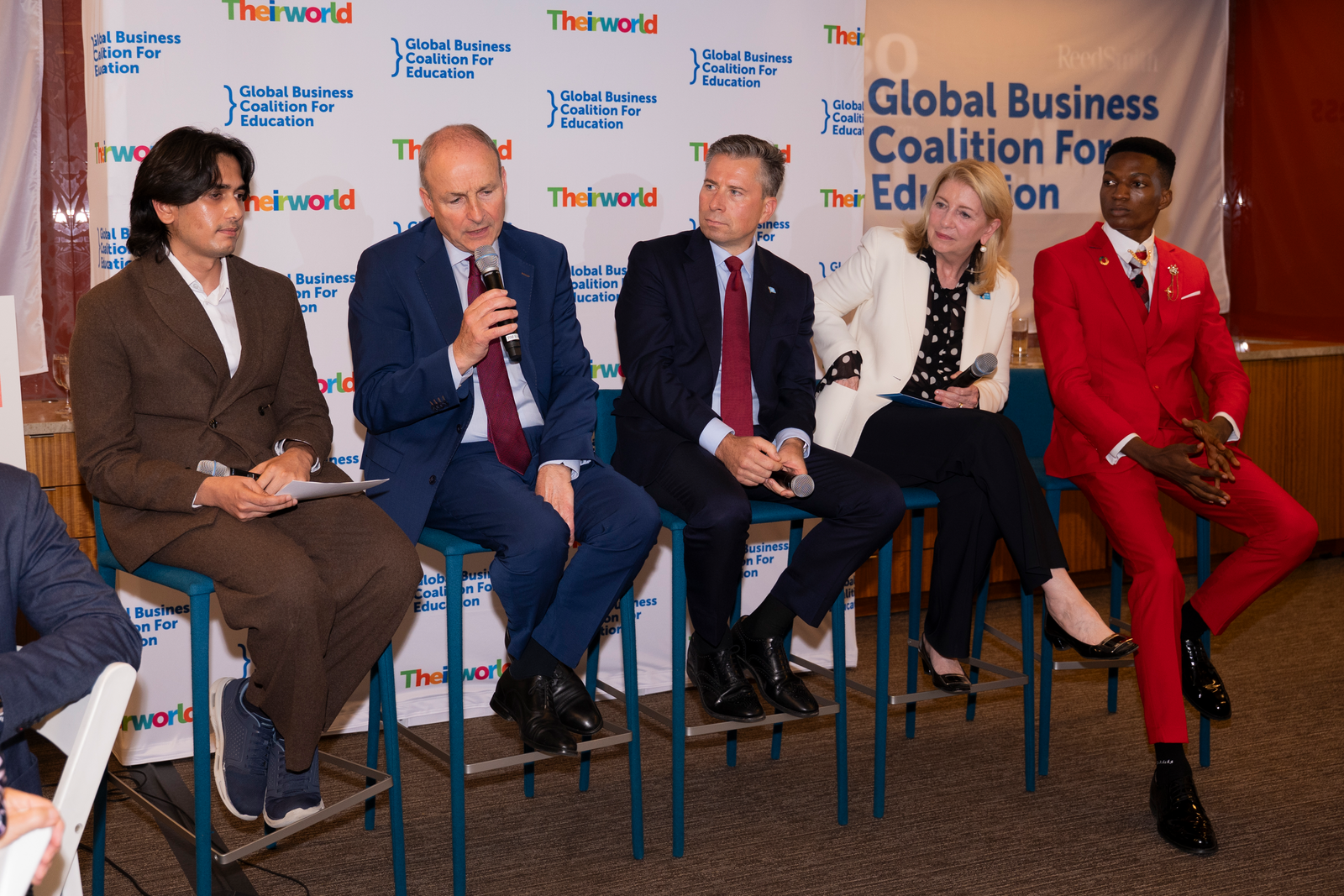Celebrating strategies that will ensure a brighter future for children

Leaders and changemakers gathered at a Theirworld event during the UN General Assembly to discuss the crucial role of education in tackling challenge and offering solutions.
Leaders from across the world gathered today to celebrate the crucial role of education in ensuring every child has the best start in life, a safe place to learn and skills for the future.
Changemakers from governments, international agencies, businesses, academia, civil society and youth heard about a variety of solutions that address the challenges facing young people today and promote opportunity and hope.
Theirworld’s Annual High-level Global Education Dinner was held during the United Nations General Assembly in New York. It was co-hosted by Gordon Brown, the UN Special Envoy for Global Education, World Health Organization Ambassador and former UK Prime Minister, and Sarah Brown, Chair of Theirworld and Executive Chair of the Global Business Coalition for Education.
Speakers shared their powerful thoughts on collective strategies and entrepreneurial endeavours that support Sustainable Development Goal 4 – equitable and inclusive quality education for all. Against a backdrop of cuts in international aid, the necessity for increased global co-operation was also a major talking point.
In his opening remarks, Gordon Brown said: “After 80 years of the United Nations, 270 million children are still not going to school, 1.2 billion are in poverty and there is still a huge amount we have to do. But the message must be one of hope.”

Gordon Brown welcomes Her Majesty Queen Mathilde of the Belgians to the event
He talked about new research that shows people are still happy to support international co-operation if positive results can be shown, particularly for the benefit of children. Brown added: “The message that came out is you have to give the case for education and the difference it makes.”
He then introduced Her Majesty Queen Mathilde of the Belgians, who is an SDG Advocate. She spoke about the lifelong challenges facing children and youth today, including conflict and climate change. Queen Mathilde added: “We are all in agreement that education is undoubtedly the key to giving them a chance and a future – that is the best way to fight poverty and marginalisation, especially for girls.
“Let us shape new ideas to help give children around the world the best possible start in life and fight for one of the noblest goals for the future of our planet – quality education.”
During the event, two champions for education received Theirworld Unlock Big Change awards. They were Muhammad Yunus, Nobel Laureate and Chief Adviser of Bangladesh (head of the interim government), and Filipo Grandi, United Nations High Commissioner for Refugees.
Yunus won the 2006 Nobel Peace Prize, along with the Grameen Bank – which he established in 1983 – for their efforts to create economic and social development for low-income people in Bangladesh. He implemented several initiatives to promote education, especially for children and women. Brown said of him: “No project in the private sector has done more to release people from poverty in the past 50 years.”

Filipo Grandi accepts his Unlock Big Change award from Global Youth Ambassador Joâo Dari de Morais Barbosa Sariva
Yunus talked about his belief that credit is a human right, just like with food, health and the right to work. He said: “If you open the door to the financial system, nobody will be a poor person any more. I included education in the microcredit package and we helped women to make sure their children to get to school.”
He told how his credits allowed people to start businesses and change their lives and their family’s lives, adding: “As a child you should be learning how to become an entrepreneur.” He told how the university he founded taught that business can be used to change the world and added: “All human problems can be solved in a business way.”
Grandi is a strong advocate for refugee education and has overseen a decade of efforts to increase refugee enrolment in all levels of learning. He said: “For more than 40 years I have been part of responses to crisis all over the world. What I have learned, among many things, is that lack of education is central to crisis and providing education has to be part of the response.”
The event then heard from Ngozi Okonjo-Iweala, Managing Director of the World Trade Organization, who also received a Theirworld Unlock Big Change award in 2020.
She spoke about the importance of trade in a time of global uncertainty, saying: “How are countries going to finance education without trade? The world trading system is dented but it is resilient. We have to reform the system but exciting things are happening in trade. This will help countries to finance education.”
Another main focus of the evening was a panel discussion titled Addressing Contemporary Challenges and Promoting Hope for the Future, which was moderated by Theirworld Global Youth Ambassador Arpan Patel from India.

Theirworld Global Youth Ambassador Arpan Patel with the panellists Micheál Martin, Tom Fletcher, Catherine Russell and Victory Ashaka
The panellists were Micheál Martin, Taoiseach (Prime Minister) of Ireland ; Tom Fletcher, UN Under-Secretary-General for Humanitarian Affairs and Emergency Relief Coordinator ; Catherine Russell, Executive Director of UNICEF; and Victory Ashaka, Theirworld Global Youth Ambassador from Nigeria.
Micheál Martin was asked about the role government leaders can play in shaping the future of education. He said: “Governments have to see education as an investment, not an item of expenditure. They must see it as central to their mission. In crisis, we have to think of education as being multidisciplinary to overcome trauma and enable children to access learning.”
Tom Fletcher spoke about giving children a safe place to learn, especially during crises such a conflicts and natural disasters. He said: “We go out to these crises on your behalf and we see places where inhumanity has ripped education from young people. But we also see the educators bringing the humanity back. We will keep education at the heart of everything we do.”
Catherine Russell said: ”At UNICEF we consider education lifesaving. Even countries not in crisis are struggling with debt, so education is a massive challenge. But there is a real awareness of the need for foundational learning and education for adolescent girls.” She also spoke about the importance of digital skills and harnessing artificial intelligence.
As a young education advocate from Nigeria, Victory Ashaka was asked why it is important that bold action is taken now. He said: “I believe that we are losing the potential changemakers and leaders. The gift of education is very important.” He passionately recited a poem about the importance of giving every child the opportunity to fulfil their potential.
Sarah Brown also paid tribute to three government ministers – Dr Yevhen Kudriavets, First Deputy Minister at Ukraine’s Ministry of Education and Science; Camilo Santana, Minister of Education in Brazil; Shri Anil Malik, Secretary, Ministry of Women and Child Development of India. She also mentioned the presence of the First Ladies of Angola (Ana Dias Lourenço), Guatemala (Lucrecia Peinado) and Sierra Leone (Fatima Bio), who have all been supporters of the Act For Early Years campaign.